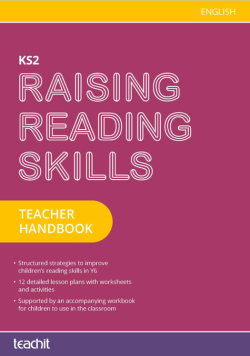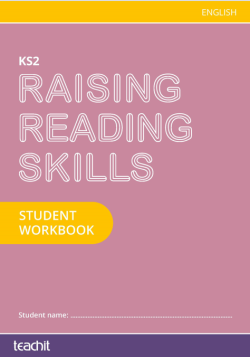Raising reading skills – teacher handbook and student workbook


Recent research shows that one in seven children will begin secondary school as a struggling reader (Martell, 2018).
This downloadable teaching pack aims to support upper KS2 children to practise and consolidate their reading skills in preparation for SATs and the transition to KS3.
Based on practical, evidence-based reading comprehension strategies, Raising reading skills will develop children's reading fluency, building their confidence in - and enjoyment of - reading.
The Raising reading skills teacher handbook - for experienced teachers, non-subject specialists and TAs - will take you through the 12-week programme step-by-step, with detailed lesson plans and practical CPD guidance on how and why these reading comprehension strategies work.
The Raising reading skills workbook provides children with everything they need, including a range of engaging texts, classroom activities and worksheets.
Lessons are devised for 1:1, small group and whole group booster sessions or as a complementary resource for English lessons.
(Please note that Raising reading skills is based upon the KS3 English intervention pack, Fix it reading, and contains some of the same content.)
What's included?
- The teacher's handbook includes 12 detailed lesson plans, starter and plenary ideas, homework tasks and evidence-based teaching notes and CPD guidance.
- The accompanying workbook includes carefully selected texts to engage developing readers, as well as worksheets and activities.
- Includes fiction and non-fiction texts on a range of engaging themes, with extracts from accessible young adult novels like Home Ground and I, Coriander as well as graphic novels, news articles, websites, and fact sheets.
What's inside?
Teacher's Handbook
An introduction to Raising reading skill (page 3)
About the author and how to use the teacher handbook (page 4)
Understanding a child’s reading level (page 5)
What difficulties do struggling readers face at secondary school? (page 6)
The learning experience for developing readers: advice for teachers (page 6)
What does a confident reader look like? (page 7)
Selecting appropriate texts to read (pages 7-8)
Section 1: Practical reading comprehension strategies (pages 9-41)
- 1a Practical strategies for supporting children’s comprehension
- Lesson 1: Skimming and scanning
- Lesson 2: Predictions and questions
- Lesson 3: Questions and signposts
- 1b Practical strategies for inferring meaning
- Lesson 4: Inference
- Lesson 5: Inference
- 1c Practical strategies for summarising
- Lesson 6: Summarising and note-taking
- Lesson 7: Summarising and note-taking
- 1d Practical strategies for word recognition
- Lesson 8: Word detectives (part 1)
- Lesson 9: Word detectives (part 2)
- Lesson plans: Practical strategies for supporting children’s comprehension
Section 2: Group reading strategies (pages 42-52)
- 2a Reading aloud
- Reciprocal reading
- Lesson 10: Reciprocal reading (part 1)
- Lesson 11: Reciprocal reading (part 2)
- Lesson 12: Reciprocal reading (part 3)
Teacher observations: Reading confidence and progress (page 53)
Parental tips for supporting reading (page 55)
Student Handbook
Introduction (page 3)
Reading survey (pages 3-5)
Reading strategies (page 6)
Lesson 01: Skimming and scanning (pages 7-11)
- Text 1: UK Black Lives Matter protesters pull down statue of slave trader…
Lesson 02: Predictions and questions (pages 12-16)
- Text 2: Scott’s Last Expedition
Lesson 03: Questions and signposts (pages 17-24)
- Text 3a: Surfers Against Sewage: The Problem with Plastic Pollution
- Text 3b: Greenpeace UK: 9 ways to reduce your plastic use
- Text 3c: Schoolgirl launches campaign calling on magazines to scrap…
Lesson 04: Inference (pages 25-29)
- Text 4: Patina
Lesson 05: Inference (pages 30-33)
- Text 5: Home Ground
Lesson 06: Summarising and note-taking (pages 34-38)
- Text 6: Kids' Survival Guide: Practical Skills for Intense Situations
Lesson 07: Summarising and note-taking (pages 39-43)
- Text 7: Eating insects: Should we be eating more? Why are they so good?
Lesson 08: Word detectives (part 1) (pages 44-48)
Lesson 09: Word detectives (part 2) (Pages 49-53)
- Text 9: ‘The Pie Thief’
Lesson 10: Reciprocal reading (part 1) (pages 54-57)
- Text 10: I, Coriander – part 1
Lesson 11: Reciprocal reading (part 2) (pages 58-63)
- Text 11: I, Coriander – part 2
Lesson 12: Reciprocal reading (part 3)
- Text 12: Asha & the Spirit Bird
This is a sample from the student workbook:
Lesson objective:
Practise the skill of predicting and questioning to understand a more difficult text.
Understanding as you read a more difficult text.
- Predictions are useful when you start reading.
- You can keep predicting as you read through a text.
- You might change your mind about a prediction as you read more of the text.
You will be reading some journal entries by Captain Robert Falcon Scott from a book called Scott’s Last Expedition for this activity.
Questions:
What questions do you have after reading just the title?
Predictions:
What do you predict the text will be about?
Prior knowledge:
What do you already know about this subject?
Read the first paragraph on page 15
Review your first prediction – were you correct? What do you predict will happen next?
Visualising:
Draw three simple images to show what happened in the text.

